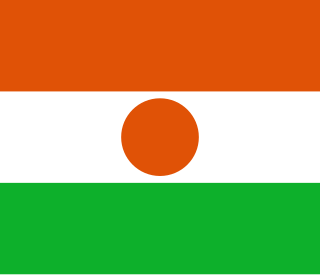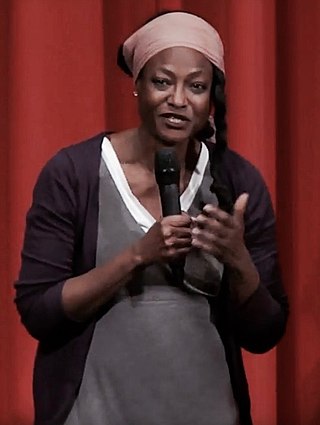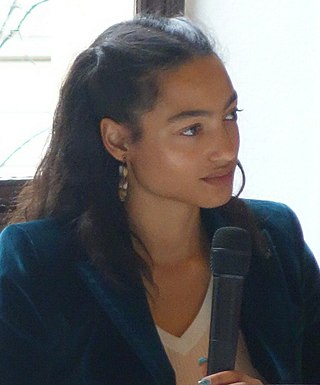Related Research Articles

The music of Niger has developed from the musical traditions of a mix of ethnic groups; Hausa, the Zarma-Songhai, Tuareg, Fula, Kanuri, Toubou, Diffa Arabs and Gurma and the Boudouma from Lac Chad.
André Salifou was a Nigerien politician, diplomat, and professor. He was president of the High Council of the Republic during the 1991–93 transitional period, briefly served as Minister of Foreign Affairs in 1996, and was an unsuccessful presidential candidate in 1999.
The Cinema of Niger began in the 1940s with the ethnographical documentary of French director Jean Rouch, before growing to become one of the most active national film cultures in Francophone Africa in the 1960s-70s with the work of filmmakers such as Oumarou Ganda, Moustapha Alassane and Gatta Abdourahamne. The industry has slowed somewhat since the 1980s, though films continue to be made in the country, with notable directors of recent decades including Mahamane Bakabe, Inoussa Ousseini, Mariama Hima, Moustapha Diop and Rahmatou Keïta. Unlike neighbouring Nigeria, with its thriving Hausa and English-language film industries, most Nigerien films are made in French with Francophone countries as their major market, whilst action and light entertainment films from Nigeria or dubbed western films fill most Nigerien theatres.

The following outline is provided as an overview of and topical guide to Niger:

Le Wazzou polygame is a 1971 Nigerien/French film about polygamy directed by and starring Oumarou Ganda. It was produced by Argos Films in France. It won the Grand Prize at the 1972 Panafrican Film and Television Festival of Ouagadougou and was the first official winner of that festival.
Moustapha Alassane was a Nigerien filmmaker.

Sarraounia is a 1986 historical drama film written and directed by Med Hondo. It is based on a novel of the same name by Nigerien author Abdoulaye Mamani, who co-wrote the screenplay. The novel and film concern the real-life Battle of Lougou between Azna queen Sarraounia and the advancing French Colonial Forces of the Voulet-Chanoine Mission in 1899. Sarraounia was one of the few African tribal leaders that resisted the advances of French expansionists Paul Voulet and Julien Chanoine. The film won the first prize at the Panafrican Film and Television Festival of Ouagadougou (FESPACO) and was critically well received.
Toula ou Le génie des eaux is a 1973 drama film directed by Moustapha Alassane.
Moustapha Alassane's Cinema of Possibilities is a 2009 documentary film.

Yaba Badoe is a Ghanaian-British documentary filmmaker, journalist and author.
Mariama Hima Yankori is a Nigerien film director, ethnologist and politician. She became the first female Nigerien film director in the 1980s, was State Secretary of Promotion of Women and Protection of Children, and later the first female Nigerien ambassador to France.
Aïchatou Boulama Kané is a Nigerien politician. She served as Minister of Foreign Affairs of Niger and later served as Minister of Planning, both in 2016. Six years later in 2022, she was Niger's ambassador to France.
Mariama Keïta was Niger's first woman journalist and feminist activist.

Rahmatou Keïta is a Nigerien journalist, writer, and film director, whose film career began in 1990. She won the prestigious 7 d'or for L'assiette anglaise (2005) and the Sojourner Truth Award for Al'lèèssi…, her first feature film.
Mariama is a female name. It may refer to:

Sarah Magaajyia Silberfeld is a French actress and film director.

The 2021 Nigerien coup d'etat attempt occurred on 31 March at around 3 am WAT after gunfire erupted in the streets of Niamey, the capital of Niger, two days before the inauguration of president-elect Mohamed Bazoum.
Djingarey Alhassane Maïga, is a Mali-born Nigerien film director and actor. He is best known for the animation works such as Black Barbie. He is also worked as a photographer, assistant director, assistant, camera operator.
References
- ↑ Zalika Souley, doyenne of African cinema, dies at 74
- 1 2 Abdourahmane Idrissa; Samuel Decalo (2012). "Souley, Zalika". Historical Dictionary of Niger. Scarecrow Press. p. 418. ISBN 978-0-8108-7090-1.
- ↑ Gbadamassi, Falila (15 November 2019). "Les comédiennes africaines ont désormais leur association après une assemblée historique en Côte d'Ivoire" [African actresses now have their association after a historic assembly in the Ivory Coast] (in French). France Info.
Cette assemblée et cette 8e édition du Festilag ont été l'occasion de rendre hommage aux actrices pionnières du cinéma africain [...] la Nigérienne Zalika Souley [This assembly and this 8th edition of Festilag were an opportunity to pay tribute to the pioneering actresses of African cinema [...] the Nigerien Zalika Souley]
- 1 2 Yaba Badoe, Women at Ouagadougou: Yaba Badoe talks to three women directors at this year's Fespaco, Feminist Africa, Issue 4, 2005.
- ↑ Audrey Thomas McCluskey (2007). Frame by Frame III: A Filmography of the African Diasporan Image, 1994-2004. Indiana University Press. p. 30. ISBN 0-253-34829-3.
- ↑ Regnier, Isabelle (16 November 2010). ""Al'lèèssi" : le destin d'une actrice africaine" ["Al'lèèssi": the fate of an African actress]. Le Monde (in French).